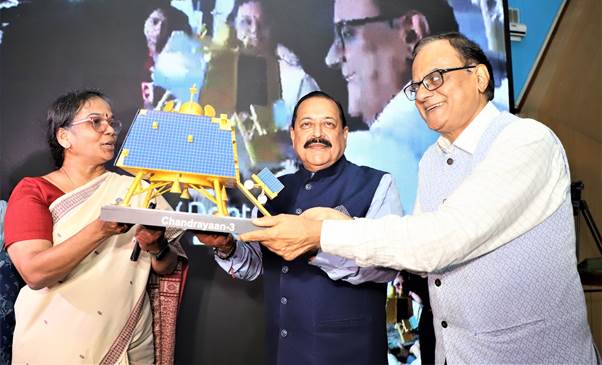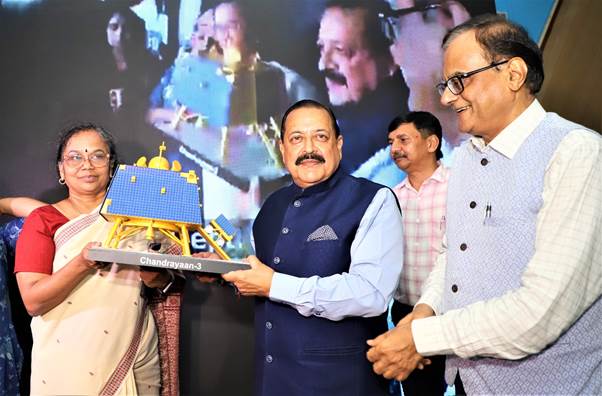“Hail India on Moon! Hail ISRO!”.
This was the opening sentence of Union Minister of State (Independent Charge) Science & Technology; MoS PMO, Personnel, Public grievances, Pensions, Atomic Energy and Space, Dr Jitendra Singh, who is also MoS Incharge Space, soon after the successful soft landing of Chandrayaan3 on the surface of Moon in the South Pole area, this evening.
Simultaneously, in a tweet which exactly coincided with the precise moment of the landing of Chandrayaan-3, Dr Jitendra Singh said, “While others fantasize Moon, we have felt the Moon. While others stuck in flight of dreams, Chandrayaan3 has actualised the dream. Tricolour flies high in lunar skies affirming India’s resolve, as articulated by PM Modi, ‘Sky is not the limit’”.
In a brief statement to the media, Dr Jitendra Singh complimented ISRO Chairman, Shri S. Somanath, Mission Director, Shri Mohan Kumar and the entire Team ISRO for having placed India’s national pride on the Moon in the virgin terrain of South Polar area, not accessed by any other space mission so far. He said, it is difficult for common citizens to understand how much consistent labour, hard work, commitment and passion have been put in while working day and night for months and years together to ensure meticulous planning and minutest details for the success of the mission.

After today's successful feat, Dr Jitendra Singh said, India has reaffirmed its position as a world's frontline leading nation in the Space sector. He gave full credit to Prime Minister Shri Narendra Modi for enabling India’s Space scientists to vindicate the dream of their founding father Vikram Sarabhai by "unlocking" India’s Space sector and providing a milieu in which India’s huge potential and talent could find an outlet and prove itself to the rest of the world.
Dr Jitendra Singh further informed that the Vikram has landed in a hazard-free location with the help of its algorithm and instruments and the tilt to the Lander is very small as measured by the inclinometers onboard. While the cameras onboard the Vikram have beamed the pictures of the moon and confirmed the touchdown, the confirmation is available from other sensors as well, he added.
Narrating the further sequence of activities from this moment onwards, Dr Jitendra Singh said, the experiments onboard Vikram and Pragyan will be happening on all days and as much data will be collected from all instruments until the Moon’s Day lasts for the next 14 days.
On the Lander, the Minister informed that the instruments in operation include CHASTE (Chandra’s Surface Thermo-Physical Experiment) to carry out the measurements of thermal properties of the lunar surface near the polar region, LRA (Laser Retroreflector Array), RAMBHA-LP- a Langmuir Probe to measure surface plasma density, a laser reflector mounted on the corner of the Vikram for accurate positioning measurement of Lander on the Lunar surface by future orbiters, ILSA - Instrument for Lunar Seismic Activity to measure seismicity around the landing site and to understand the structure of the lunar crust and mantle, LIBS- Laser Induced Breakdown Spectroscopy to determine the elemental composition (Mg, Al, Si, K, Ca,Ti, Fe) of Lunar soil and rocks around the lunar landing site, APXS - Alpha Particle X-Ray Spectrometer to measure the chemical composition and mineralogical composition to further enhance our understanding of Lunar-surface and SHAPE - Spectro-polarimetry of HAbitable Planet Earth to study the spectro-polarimetric signatures of the habitable planet Earth in the near-infrared (NIR) wavelength range (1 – 1.7 μm).

Dr Jitendra Singh said, at the end of next 14 days followed by night and extreme cold conditions when the day breaks again, solar power generation for Vikram and Pragayaan is expected to start again. Meanwhile, the orbiter is designed to withstand long periods of life, he said.
<><><><><

